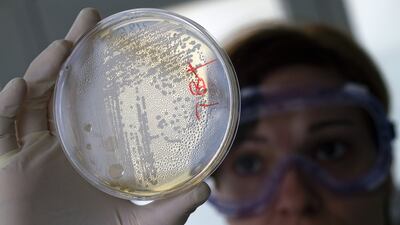An Abu Dhabi hospital is helping in the fight against super bugs with an online portal for doctors that provides local data on resistance to antibiotics.
Sheikh Shakhbout Medical City, a collaboration of Mayo Clinic and Abu Dhabi Health Services Company (Seha), created the platform to promote the proper use of antibiotics and assess resistance to them.
Antibiotics, which kill bacteria, have saved many millions of lives since they were first used routinely in the 1940s.
But they have been prescribed too often unnecessarily, which has created resistant bacteria known as superbugs, making it harder to treat serious infections.
The hospital's platform gives up-to-date guidance on treatment options, local patterns of antimicrobial resistance and drug information to ensure they are used safely and effectively.
The information can be accessed by mobile phones and computers.
“Antimicrobial resistance is one of the biggest public health challenges of our time, with nearly five million associated deaths reported in 2019 alone, based on a recent study by The Lancet,” said Dr Zahir Babiker, a consultant physician at SSMC's Division of Tropical and Infectious Diseases.
“Antimicrobial resistance occurs when germs present in the human body stop responding to the medications designed to kill them. As a result, germs such as bacteria, fungi, parasites, and viruses will continue to grow and pose a serious risk to the lives of people who are harbouring those germs.
“Therefore, careful use of antimicrobial agents such as antibiotics is important and requires educating people and persuading clinicians to follow an evidence-based approach for prescribing antibiotics.”
Overprescription is a major factor behind antimicrobial resistance.
Antibiotics are often overprescribed when people seek a prescription believing it will cure them, while doctors fear a reaction if they refuse to write one.
Antibiotics do not work against viruses.
And they can do harm, even if they are needed to treat bacterial infections.
Studies have shown that antibiotics can weaken the body’s immune system’s ability to fight infection, and could be implicated in the development of autoimmune diseases.
But prescription drugs such as Penicillin — the world's first antibiotic discovered by Scottish researcher Sir Alexander Fleming in 1928 — have saved millions of lives.
And if they are no longer effective, medical professionals fear patients would be left at greater risk from serious infections through something as innocuous as a scratch.
A report on the scale of the problem, conducted in 2014 by the economist Jim O’Neill, suggested current annual death rates caused by antimicrobial resistant infections could be as high as 700,000, and may rise to 10 million by 2050 if nothing is done.
“We still have a long way to go to raise awareness and educate the broader public about the seriousness of antimicrobial resistance and that antibiotics are neither a one-size-fits-all solution nor the only solution,” Dr Babiker said.
“We are optimistic that with antimicrobial management tools we can equip ourselves with the information we need to devise the best care plans for our patients, including those infected with resistant germs.”
The UAE operates its own Antimicrobial Surveillance Programme, run by the Department of Health of the Emirate of Abu Dhabi, which collects data from dozens of hospitals.


